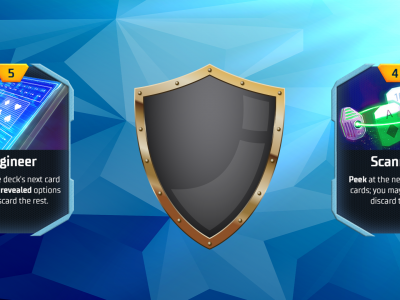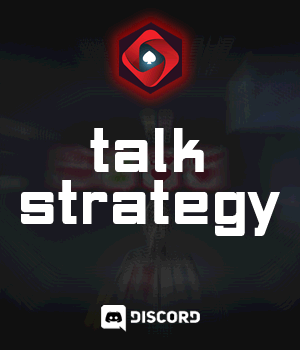If you believe the classic saying, discretion is the better part of valour, it seems to be true for power up as well. I’ve been looking at the dynamics in Power Up during the past few days and controlling actions other players can make has become a focus in my play.
Rather than just worrying about opening up further betting action, in power up, you also need to be worried about opening up actions with Power cards as well. As I’ve been playing, it has become apparent that the strength of power cards cuts both ways, and sometimes it’s more important to close the action than increase your value in a hand.
The situations this is most obvious in are after you’ve played your own power card and have selected the next card in the deck. In poker, if you have a high likelihood of hitting a draw with the next card, you usually want to increase the size of the pot.
In power up, we have more to consider. Giving our opponent’s an extra action can significantly change our chances of winning the hand.
Let’s look at a specific hand situation. We’re on the button, and we’ve got a flush draw on the flop.
Our opponent has checked. We’ve just played Intel, and we can see that the next card to be dealt is going to complete our flush. My gut instinct is to try and get as much into the pot right now as I can. I’m going to win the hand!
The problem with that is our flush card isn’t guaranteed. In Power Up, our opponent can play a number of power cards to remove our flush card from the game. We must take that into consideration when we think about betting.
When we bet in this situation, we may put pressure on the other players in the hand, but we give them the opportunity to play power cards. If they want to continue, they can play one of several power cards that can really mess with what we want to happen.
Disintegrate can wipe out our flush by eliminating one of the cards from the board. Scanner or Engineer can directly impact the next card in the deck, allowing our opponent to pick the next card. Reload and Upgrade also pull the top card from the deck.
So, now we have to balance our desire to win more chips, with the chances of our opponents taking away the flush we know is going to hit on the turn. The factors we must take into consideration are how many power cards does our opponent have and how many Energy Points does our opponent have?
The chances of the other player having one of the cards that messes with us, obviously increases the more power cards they have. As players can only hold one of any card, if they have 1 power card, only 4 of the possible 9 cards they hold don’t give them the chance to change the top card of the deck. If they have 3 cards, it is almost certain that one of these cards is in their hand. They will need at least 4 Energy to play the cards, and if they have 5 Energy, they can play any of the cards that mess with us.
However, we can just cut off these options by either checking our option on the flop or calling a bet from our opponent rather than raising. We can also play an EMP card of our own, but this pretty much places our card face up on the table, and we’re only going to get called by a better hand. At least in theory.
As you can see from this, I’m more than just dipping a toe into the strategy pool of Power Up, and it’s a lot deeper than I original considered it to be. I’m going to have to start crunching some numbers and going through the decision tree for Power Up, but it’s not going to be a simple job. I’ll bring the results of this to PlayPowerUp.com for you guys to use as well.
I hope this has given you more to think about as you play your own Power Up sessions, and I hope to see you back here soon.











